Feeling like your contracting business is just another brick in the wall? Many contractors share this struggle of going unnoticed online.
This guide will show you how to build a strong digital foundation. We’ll cover why SEO is vital for contractors, the power of targeted keywords, and how local SEO can draw in more clients.
You’ll also learn to optimize your Google Business Profile, improve your website, and create compelling blog content. With these strategies, your business can stand out online and attract more clients.
Let’s show you how SEO and SEO tools lay the groundwork for success.
Why is SEO useful for contractors?
Feeling buried under a mountain of online competition? SEO is your jackhammer, breaking through the digital concrete to reveal your contracting business to a wealth of potential customers.
Think of it this way: when homeowners need a roof repair or a kitchen remodel, where do they turn? To Google of course.
And if your website isn’t showing up in those search results, you’re missing out on a goldmine of organic traffic. SEO transforms your digital presence from a dusty shack to a gleaming skyscraper.
How Does SEO Build Your Contracting Empire?
- More Leads: Studies[1] show the first result on Google gets almost 28% of all clicks.

(Source https://backlinko.com/google-ctr-stats)
- Qualified Prospects, Not Just Browsers: SEO targets users specifically looking for “kitchen remodelers” or “electricians,” ensuring your leads are ready to hire.
- Transform Clicks into Contracts: A well-optimized website guides potential clients through the sales funnel, turning website visits into project inquiries and bookings.
- Become the Local Authority: Increased visibility builds trust, establishing you as the go-to expert in your community and outshining competitors.
In the cutthroat world of contracting, SEO isn’t just a luxury; it’s a necessity. It’s the difference between being just another name on a list and becoming the go-to contractor in your area.
Construction SEO keywords

Every successful construction project begins with a blueprint. In the world of SEO, your keywords are those essential building blocks, shaping your online visibility and making your website a sturdy structure that Google can’t resist.
But how do you choose the right materials? Start by identifying those niche keywords that your target audience is actively searching for.
This is where software platforms like Ahrefs and KWFinder prove invaluable, unveiling the most coveted keyword rankings to give you a competitive edge.
Here are some initial ones we found on Ahrefs:
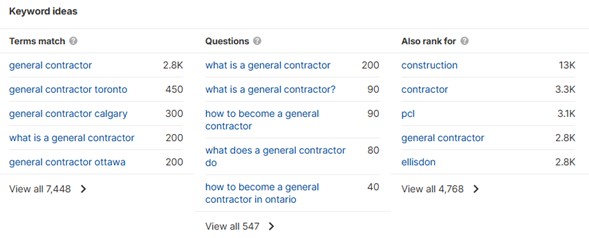
And on KWFinder:
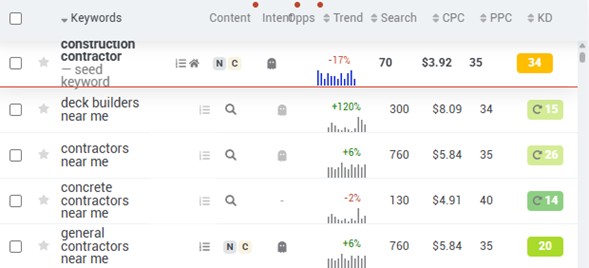
KWFinder also showed us some data about who you’d be up against to rank number one for “Contractor Toronto” – at the moment it’s the mighty Homestars directory:
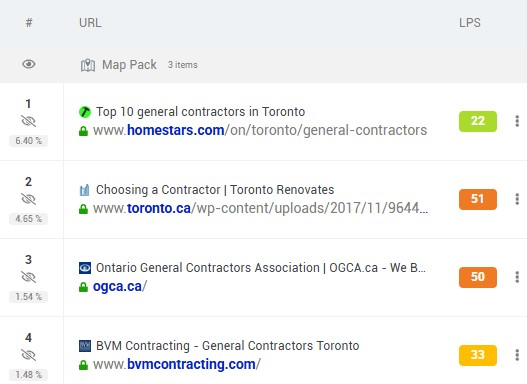
Once you’ve got your keywords, strategically integrate them throughout your website—from your homepage to service pages and even blog posts.
Keywords are the cornerstone of your SEO strategy. Keywords act as a magnet, pulling in potential customers actively seeking your services. By ranking higher for relevant keywords, you bring more visitors likely to convert into paying clients, thereby increasing organic traffic. Keywords should also guide your blog and website content creation, ensuring they resonate with your audience and drive traffic. We recommend you track your keyword rankings in Google Analytics to gauge the effectiveness of your SEO efforts.
Pro Tip: Both KWFinder and – in particular – AHrefs can be very expensive to compile a compelling list of keywords. Consider outsourcing all your keyword hunting to professionals who know how to find your ranking gems.
Local SEO for contractors
When a homeowner two streets over needs a leaky roof fixed, local SEO makes sure your company is the first name they see.
Local search engine optimization extends beyond broad keywords. Think hyper-local optimization – like city names, neighborhood references, and even zip codes woven strategically into your website’s content.
It also involves claiming and optimizing your listings in reputable online directories, like Yelp, Angie’s List, Houzz, or your local Chamber of Commerce directory:
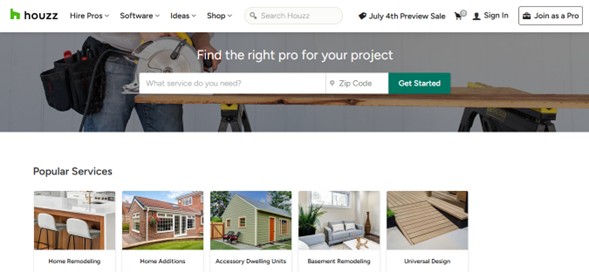
Local SEO is your hometown hero. When implemented correctly, it should help you rank at the top of Google’s search results. It works by placing your business name on the map, right in for of your audience’s eyes, thereby signaling to them not only that you are in their local area but that you’re a reputable business in the community.
But local SEO isn’t a one-and-done deal. It’s a continuous process of building your online reputation through reviews, citations, and engaging content. By embracing these tactics you’re building a loyal customer base right in your neighborhood.
Pro Tip: Ensure your Name, Address, and Phone Number (NAP) information is consistent across all online platforms. Discrepancies can confuse search engines and hurt your local rankings.
Google Business Profile for Contractors
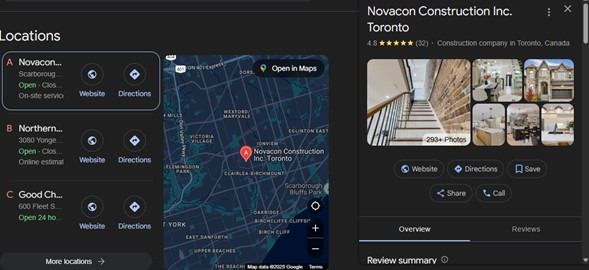
Image: Novacon Construction Inc Google Business Profile
Think of your Google Business Profile (GBP) as your collection of tools designed to help you win over local clients.
It’s where a homeowner looking for a “kitchen renovation contractor near me” discovers your business, checks out your glowing reviews, and gets a sneak peek at your past projects.
A strong GBP doesn’t just boost your online reputation, it also supercharges your local SEO.
So, how do you wield this digital multi-tool?
Power Up Your GBP:
- Select specific categories (e.g., “bathroom remodeling contractor” or “electrician”) that accurately reflect your services. This will help you showcase your expertise.
- Keep your hours of operation accurate and up-to-date so potential customers know when they can reach you.
- Upload high-resolution photos of completed projects, showcasing your craftsmanship and attention to detail. This will provide valuable information to potential customers.
- Encourage happy clients to leave positive reviews – social proof goes a long way in building trust.
- Engage and Inform: Share regular updates, answer questions promptly, and post engaging content to keep your profile vibrant. Constantly engaging and informing your audience will go a long way.
Pro Tip: Don’t just set it and forget it! Actively manage your GBP, respond to reviews, and update your information regularly. A well-maintained profile keeps you top-of-mind for potential clients and shows Google you’re a business that means business.
Optimize Your General Contractor Website

Your contracting website is your digital brochure, a 24/7 sales rep, working tirelessly to attract and convert potential clients.
Here’s how to make sure it’s in top shape:
Step 1: SEO Audit:
Think of this as a comprehensive checkup for your website. A professional contractor web service can identify technical issues that might be slowing down your site or hindering its visibility in search results.
Step 2: On-Page SEO Optimization:
This is where the real magic happens. Optimize your meta titles and title tags with relevant keywords like “bathroom remodeler in [your city]” or “custom deck builder near you.”
Step 3: Content Optimization:
Make sure your website content is informative, engaging, and speaks directly to your target audience’s needs. High-quality images of your past projects can be a powerful tool for showcasing your expertise and building trust.
Step 4: Mobile Optimization:
With most people using their smartphones to search for local services, a mobile-friendly website is non-negotiable. Ensure your site loads quickly and is easy to navigate on smaller screens.
Step 5: Get Technical:
Don’t neglect the technical aspects. A fast, secure, and user-friendly website will not only impress potential clients but also boost your search engine rankings.
Pro Tip: For a detailed guide on conducting an SEO audit, check out our helpful resource here.
Creating a Blog on Construction

Remember our initial keyword research earlier? We briefly mentioned that the right keywords are perfect for your contractor services website blog. It’s a strategic way to attract and engage potential clients, showcase your expertise, and establish yourself as an industry authority.
You can share valuable insights on topics like choosing the right roofing materials for your climate, how long it takes to build a house in Ontario, or understanding local building codes.

Each informative blog post serves as a lead magnet, drawing in those actively seeking solutions for their construction needs.
It’s clear blogs play a crucial role. They offer a way to share your knowledge and expertise on relevant topics in the construction industry, establishing trust and credibility with prospective clients. In order to drive organic searches you should create SEO-optimized blog posts with relevant keywords to attract potential clients actively seeking your services. They also offer the opportunity to engage with readers through comments and social media shares, building relationships before they even pick up the phone. You can even showcase your work by highlighting your expertise and past projects through case studies, before-and-after photos, and testimonials.
Pro Tip: Create a content calendar to ensure a consistent flow of fresh, relevant content. This long-term SEO strategy helps you gradually climb the search rankings and build domain authority for your website.
Construction blog topics
Let’s look at how we can find blog ideas, step by step:
1. Keyword Research:
Look for less-competitive keywords that truly connect with your audience’s needs. As we’ve seen, tools like Ahrefs or KWFinder can unveil hidden gems, ensuring your blog posts attract the right kind of visitors who are more likely to convert into paying clients, boosting your conversion rates.
2. Competitor Recon:
Don’t start from the ground up. Examine your competitors’ blogs to identify popular topics and areas where their content falls short. This allows you to offer fresh perspectives, filling the gaps they’ve left behind and positioning yourself as an authority in the field, a key factor in your online success.
Using Ahrefs, this can be done by putting your competitor’s domain into Ahrefs’ Site Explorer and checking the Competing Domains report:
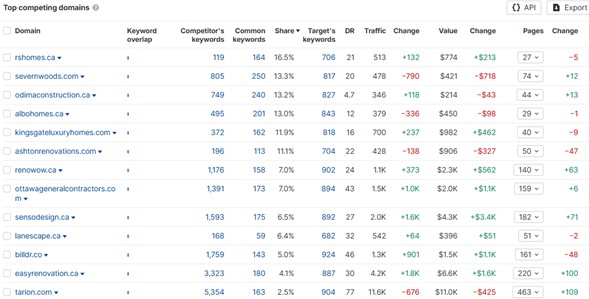
3. Local Intel:
Tap into your regional knowledge to craft content that resonates with your community and drives interested readers to your site. Discuss local building codes, popular architectural styles, or unique challenges faced by homeowners in your area.
Construction Blog Topic Ideas
Some common ideas you can begin with include:
- DIY vs. Hiring a Pro: When to Tackle Home Projects Yourself
- 5 Must-Ask Questions Before Hiring a Contractor
- Decoding Building Permits: A Homeowner’s Guide
- From Drab to Fab: Inspiring Before-and-After Renovation Stories
These ideas tackle common questions your potential customers might be having. However, we strongly recommend you conduct keyword research to back them up. After all, thinking you know your audience and what they might be interested in doesn’t necessarily correlate with reality.
In a nutshell:
Don’t simply chase clicks, prioritize creating helpful content that solves problems and answers questions for your potential clients. Remember, a well-informed client is more likely to choose your services, making your blog a powerful tool in your overall digital marketing strategy.
Link building for general contractors
Think of backlinks as your off-page SEO vote of confidence from other websites, telling Google you’re a trusted source for construction services. The more quality backlinks you have, usually the higher your website will rank in search results.
Your Game Plan For Link-Building Strategies Should Include:
- Guest Posting: Share your expertise on reputable industry blogs or publications in exchange for a valuable backlink to your website.
- Partner Up: Collaborate with suppliers or other businesses in the construction ecosystem to create mutually beneficial content that links to each other’s websites.
- Earn Media Mentions: Share your successes, community involvement, or unique projects to attract media attention and backlinks from news outlets.
- Infographic Insights: Create visually appealing infographics that summarize complex construction concepts or project data.
Here’s a stock infographic – but it gives you an idea of their potential:

- Video Tutorials: Produce informative videos demonstrating your skills or offering DIY tips. Share them on YouTube and embed them on your website to attract backlinks from other content creators.
Looking for SEO services for contractors?
We understand that SEO can feel like a maze of technical jargon and ever-changing rules. But don’t worry – just like a trusted foreman guides a construction project – we’re here to navigate it with you,
Book a free 30-minute consultation with us today and let’s see how we can get more customers knocking on your digital door.
Key Takeaways:
- Increase visibility: SEO helps potential clients find your construction services when they search online.
- Attract local leads: Target your service area with local SEO tactics like optimizing your Google Business Profile.
- Choose the right keywords: Use tools like Ahrefs and KWFinder to identify and incorporate relevant keywords into your website and content.
- Optimize your website: Ensure your website is mobile-friendly, loads quickly, and has informative, high-quality content that addresses the needs of your target audience.
- Create engaging content: Start a blog with helpful articles on construction topics, showcasing your expertise and attracting backlinks.





